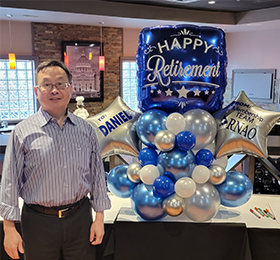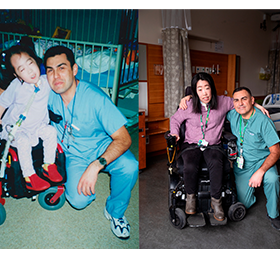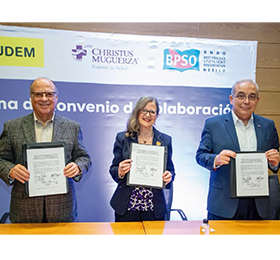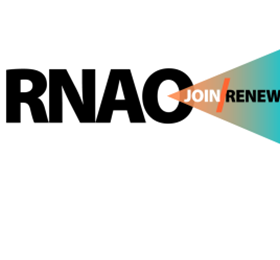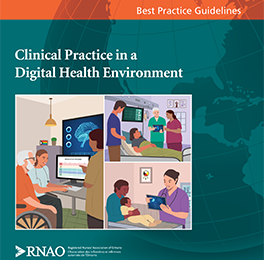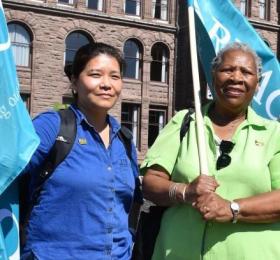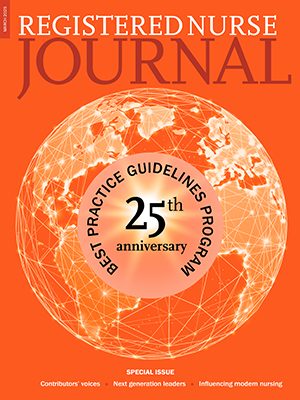Changes to RNAO’s membership team
Daniel Lau, RNAO’s director of membership and services for 22 years, stepped down from his role in January 2024 and is set to retire in June. Continuing to work as a special resource to CEO Dr. Doris Grinspun, Lau says he is immensely proud of the growth of RNAO and will miss working with the team. “During my time at RNAO, membership grew from less than 15,000 to more than 50,000,” he says proudly.
Joining the senior management team is RN Morgan Hoffarth. “I thank Daniel – deeply – for his immense contributions to RNAO,” says CEO Dr. Doris Grinspun. “Daniel leaves big shoes to fill and I am confident that RNAO’s membership growth will continue to cross many milestones under Morgan’s leadership.”
Hoffarth was RNAO president from 2020 to 2022 and says: “During my presidency, one of the areas I focused on was membership and the importance of supporting and engaging with members. The transition to director of the membership department is aligned with my vision as president. I believe RNAO membership is critical for nurses across the province.”
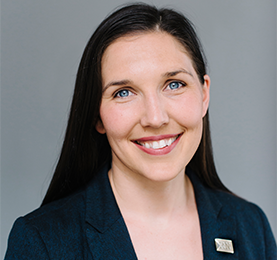
Hoffarth attended McMaster University, where she obtained a BScN. She also has a master’s degree in nursing from York University. Having worked in both acute care and long-term care settings during her career, Hoffarth’s most recent role was director of care at St. Joseph’s Health Care London.
RN and former patient now work as colleagues at rehab hospital
RN Jorge Santos has the unique experience of getting to work alongside one of his former patients at Toronto’s Holland Bloorview Kids Rehabilitation Hospital. Santos’ colleague is Emily Chan, a social worker who, until the age of six, underwent physical rehab at the hospital. Santos says the experience of working together 30 years later has been incredible. “Working with her is just – too special. It’s so amazing because I was part of her development…she showed me a picture of us when she was two (years old). When I saw that picture, I had tears in my eyes,” said Santos. Chan says she’s looking forward to helping other children with disabilities regain their full independence. (Global News, Jan. 23)
Mexico joins the #BPSO social movement of science
RNAO’s Best Practice Spotlight Organization® (BPSO®) Program is again expanding its reach beyond Canadian borders. Two organizations in Mexico – the University of Monterrey (UDEM) and Christus Muguerza, a health organization that includes 15 hospitals – have joined the program with a promise to implement BPGs related to pain management, falls and vascular access. A signing ceremony took place on March 19 in the city of Monterrey, Mexico.
"We’re proud that the BPSO program has expanded to more than 1,500 health organizations globally and is considered the gold standard for quality care and teaching," RNAO CEO Dr. Doris Grinspun says of the program she founded, and that celebrated its 20th anniversary in 2023. "We look forward to working with Mexican leaders to support them as they engage in this social movement of science, implementing guidelines and evaluating their positive impact."
Read more about these new international partnerships in the newsroom at RNAO.ca
Membership category update recognizes IENs
RNAO has changed the name of the Newly Graduated Nurse membership fee category to New RN in Ontario. The change now includes internationally educated nurse (IEN) associates. IENs who are newly registered with the College of Nurses of Ontario and are eligible to practise in the province are eligible for free RNAO membership thanks to the generosity of HUB International, one of the association’s affinity partners. Learn more about this new category on RNAO.ca
Expanded health centre provides care for vulnerable youth
NP Beth Hayhoe has been volunteering with Toronto’s Yonge Street Mission for nearly 30 years. The organization recently spent $3 million to expand its health and dental centre for youth in the city’s downtown neighbourhood. The site – which went from a 700-square-foot basement to a 4,600 square-foot space thanks solely to donations – provides care for people between 16 and 24 who are in precarious living situations. Eye exams, dental care, physiotherapy, mental health care and podiatry care are among the services provided, with wraparound supports such as employment and housing. Hayhoe says many of her clients have grown up without a lot of support in their lives. She hopes that with a newly renovated centre dedicated to serve youth, they will see that “they’re valuable enough to make this beautiful place for them and to have people come and take care of them.” (CBC News, March 2)
NEW BPG soft launch: Clinical Practice in a Digital Health Environment
Following the intense and exhaustive work of an expert panel, researchers, policy makers, people with lived experience, and the guideline development team at RNAO, the association’s newest BPG was previewed during a webinar in March, six weeks before its official release during Nursing Week 2024 in May. Clinical Practice in a Digital Health Environment is the result of a years-long development process that included the determination of scope for the BPG and the research and development of key evidence-based recommendations that will help nurses to strengthen their professional practice as today's health environment becomes more digitized.
Watch for details of RNAO’s various Nursing Week events for full details on the upcoming launch and publication. (RNAO.ca/news)
Roving simulation cart brings education to nurses
Mackenzie Health in Richmond Hill offers simulation training for its staff through Sim2You, a mobile simulation unit that allows teams to learn in non-traditional ways. “Using the Sim2You roving cart, we’re not only ensuring that training is more accessible to our staff, we’re also enhancing how they can adapt some of the real-life situations they may encounter in their day-to-day work caring for patients,” said simulation program lead and RN Christina Scerbo. The mobile unit, which was introduced a little over a year ago, takes its cues from staff. In a recent exercise, a mannequin’s arm was sprinkled with powder before a nurse disinfected it to insert a central line. A blue light was then directed at the arm to identify spots that may have been missed and where there’s a risk of infection. These simulations allow staff to learn how to adapt to situations and how to work as a team. “Our simulation labs immerse health-care professionals in dynamic scenarios, fostering swift and coordinated actions,” said RN Deborah Lefave, one of the program’s educators. (Hospital News, March 27)
Letter to the editor
In a letter to the editor published before the release of the provincial budget on March 26, RNAO CEO Dr. Doris Grinspun takes aim at clinics that charge for health care and advises on how NPs and NP-led clinics must be fully covered by the province to ensure timely access to quality care by NPs. (National Post, March 24)
Unfortunately, Eileen Murphy’s experience of being charged for health care in Ontario is not an isolated case. RNAO, which represents registered nurses and nurse practitioners in Ontario, knows of other clinics in the province that charge clients to access nurse practitioner services. This is unacceptable. Also unacceptable is that 2.3 million Ontarians don’t have consistent access to primary care.
To keep healthy and prevent complications when ill, everyone must have access to primary care in our publicly funded health system — without having to pay a fee. Nurse practitioners play a critical role delivering comprehensive, top-notch primary care and access to their expertise is essential. Access to nurse practitioners must be covered by the province and not via a price tag to patients.
RNAO calls on HOOPP to get rid of fossil fuel holdings
In September, RNAO sent a letter to the Healthcare of Ontario Pension Plan (HOOPP), which represents nurses and other workers in the hospital and community sectors, urging that it immediately stop any new investments in fossil fuels and divest all its holdings by 2025. This is a must to ensure pension investments focus on a just and sustainable future, not climate disruption. In the letter, RNAO CEO Dr. Doris Grinspun and President Dr. Claudette Holloway applauded HOOPP’s commitment to put $23 billion into accredited green investments by 2030, but said the fossil fuel shares it holds are at “at odds with RNAO members’ professional values and our commitment to serve the public as the first mandate of health professionals is ‘do no harm.’” In a radio interview (The Energy Mix, Nov. 20), Grinspun said that HOOPP is a “tragically literal example of investing in one’s own demise.” Earlier that same month, RNAO President Dr. Claudette Holloway and President-Elect Lhamo Dolkar attended the March to End Fossil Fuels in Toronto. RNAO continues to call on the provincial and federal governments to put forth a science-based plan to respond to the climate emergency. Sign RNAO’s Action Alert.
RNs granted new prescribing powers by Ontario government
On November 6, Health Minister Sylvia Jones announced that RNs will soon be able to independently prescribe certain medications, including medications for smoking cessation, anesthetics used topically for pain relief, and hormonal and intravaginal contraceptives. RNAO has called for RN prescribing in Ontario since 2012. Beginning in January 2024, RNs can take a course approved by the College of Nurses of Ontario (CNO), at select colleges and universities to expand their practice to include prescribing. RNAO is also urging that this training be integrated into the four-year nursing baccalaureate curriculum. RNAO President Dr. Claudette Holloway says this will provide Ontarians with accessible and timely health care. “I think our public can be fully relieved to know that they have educated professionals who will be delivering this care,” she says. (610 CKTB, Nov. 8). Read this Toronto Star op-ed from 2013 supporting RNAO's advocacy.
